Inside all aspects of Disco Elysium drama: ZA/UM shareholders, "mega crunch", toxicity, and IP stealing allegations
New details about the drama surrounding Disco Elysium and its creators have emerged thanks to an in-depth investigation by People Make Games. Let’s dive into all aspects of it, from ZA/UM’s shareholder structure and legal disputes to Robert Kurvitz’s creative leadership and his recently registered trademark called “Corinthians”.
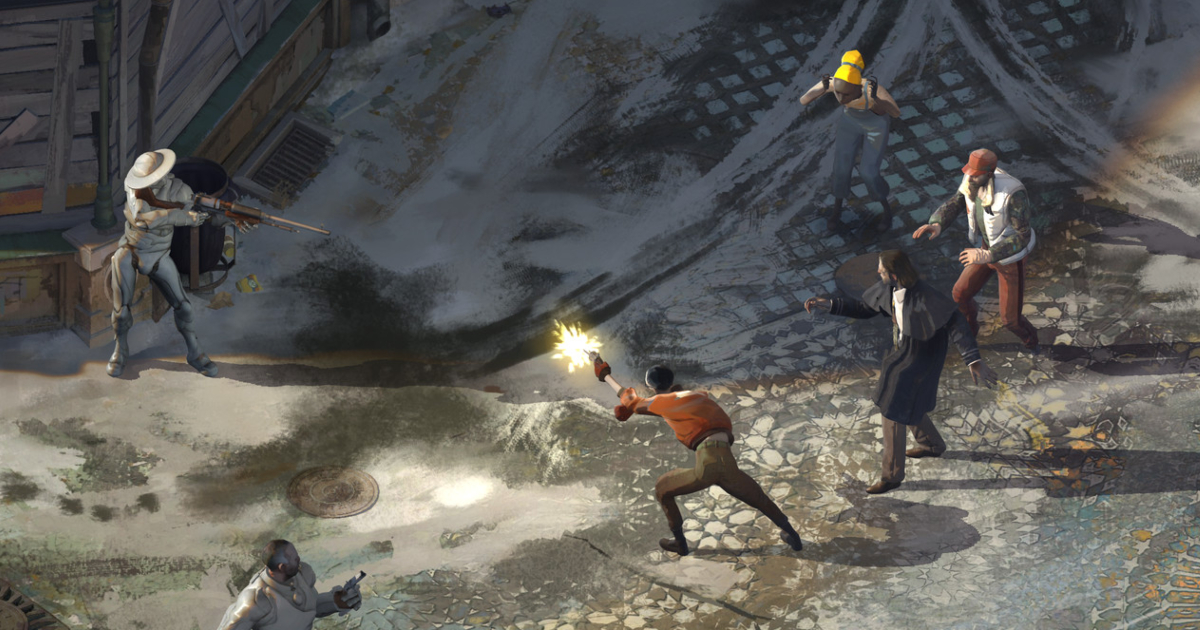
On May 29, People Make Games released a new video called “Who’s Telling the Truth about Disco Elysium?” It is a two-hour investigation that covers the whole story with as many nuances as possible.
We won’t get into all the details because we at GWO have covered the drama around Disco Elysium and ZA/UM a lot. Instead, let’s mainly focus on new information and key takeaways from this video.
But first, here is a brief reminder of the main parties involved in this situation.
Key people involved in the drama around Disco Elysium and ZA/UM
- Robert Kurvitz — the original creator of the Elysium world and the game’s lead designer and writer. He was the founding member of the ZA/UM Cultural Association (a currently dismissed group of Estonian writers and artists), some of whose key members would later join game development studio ZA/UM (originally Fortress Occident) to create Disco Elysium. In this story, Kurvitz believes that he was illegally fired last year and deprived of what he calls his life’s work.
- Aleksander Rostov (aka Sander Taal) — artist, Kurvitz’s comrade-in-arms, and another original member of the ZA/UM Cultural Association. Best known as the art director of Disco Elysium, he was also fired from the ZA/UM studio last year.
- Helen Hindpere — writer who joined the ZA/UM Cultural Association in 2009 when she was just 14 years old. She eventually became romantically invovled with Kurvitz and was also credited as the lead writer on Disco Elysium – The Final Cut. However, some other developers claim that she didn’t actually do that much writing, let alone her role as a leader.
- Kaur Kender — Estonian writer and businessman who was accused (and eventually acquitted) of producing child pornography with his controversial book Untitled 12. He funded and helped publish Kurvitz’s novel Sacred and Terrible Air and then pushed for making a video game adaptation of the Elysium world. Kender became one of ZA/UM’s first investors, originally owning a 17% stake in the studio.
- Margus Linnamäe — famous Estonian businessman who had a 83% stake in Fortress Occident (and after its rebranding to ZA/UM) through his investment firm MM Grupp. In 2021, he sold his stake for €4.5 million.
- Ilmar Kompus — investor and the head of VC firm Koha Capital who bought Kender’s 17% stake after Fortress Occident turned into ZA/UM. He is currently the studio’s majority shareholder and the man whom Kurvitz and Rostov accuse of illegally taking over the company.
- Tõnis Haavel (aka Denis Havel) — Kompus’ business partner who used to have a 50% stake in Koha Capital (“Ko” stands for Kompus and “Ha” for Haavel) before being convicted in the Baku investment fraud in 2014. He is currently claimed to be just a regular ZA/UM employee who also served as an executive producer for Disco Elysium.
- Anu Reiman — Haavel’s life partner who owns two companies, Yessirnosir Ltd and Studio 38. Some parties involved in the drama see her as somewhat of an eminence grise running money transactions for Haavel behind the scenes.
How did Ilmar Kompus become the largest shareholder of ZA/UM?
Kompus was first accused of fraudulently taking over the studio last year. The situation was detailed in a lawsuit filed by Kaur Kender, who eventually withdrew his claims and left ZA/UM. Some points in this story still feel confusing, but People Make Games’ investigation shades more light on how Kompus became the main owner of the Disco Elysium developer:
- In 2016, Ilmar Kompus held a 17% stake in ZA/UM, but there were some changes in the share split during the development of Disco Elysium (devs needed more money, so Linnamäe slightly increased his controlling stake to 85.8% by 2018 in exchange for additional funding);
- The major change in the ownership structure ZA/UM happened in 2020: Kompus increased his stake to 22.4%, while Kurvitz, Rostov, and Kender got 10.2% each;
- As a result, Linnamäe was no longer the majority shareholder, owning only 46.8% of ZA/UM following the redistribution of shares. And the remaining 0.2% was held by the studio itself;
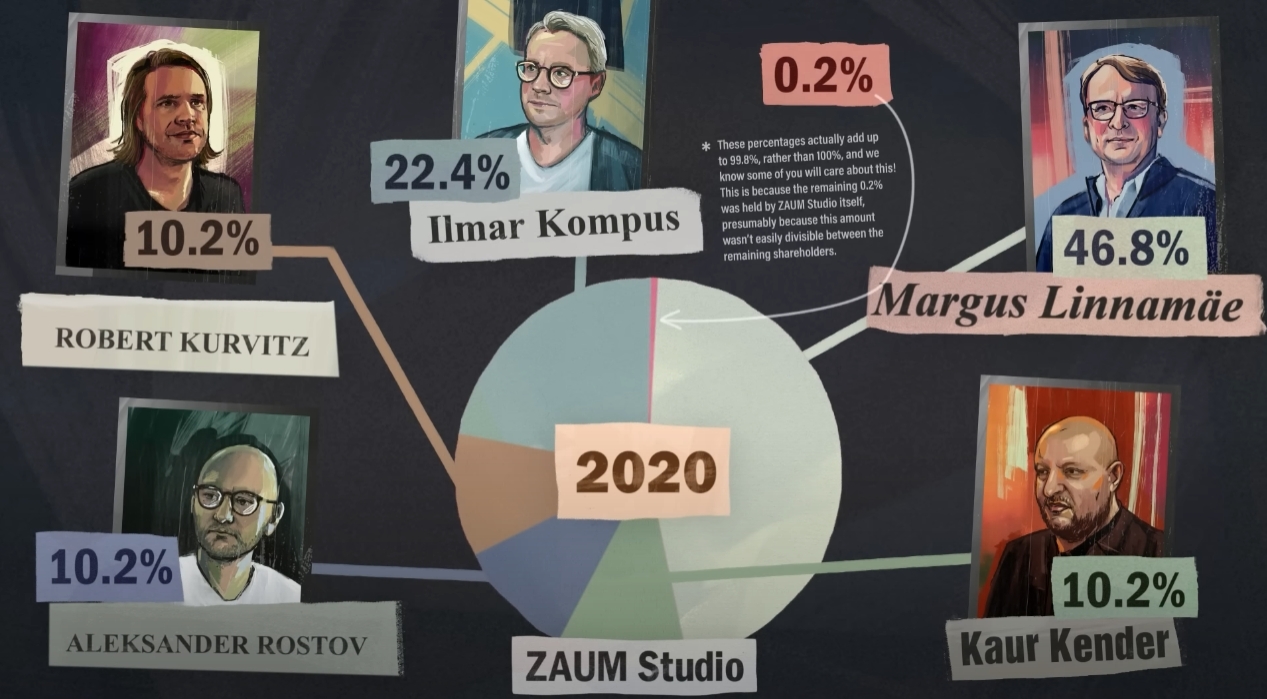
ZA/UM’s business structure as of 2020 (illustrated by People Make Games)
- It is worth noting that in October 2019, Kaur Kender established ZAUM UK Ltd, a new legal entity to hold the IP rights to Disco Elysium;
- Shares were equally split between Kompus, Kurvitz, Rostov, and Kender — each had a 20% stake, and the remaining 20% was controlled by UK company Yessirnosir Ltd. According to Companies House, Anu Reiman incorporated Yessirnosir in December 2019 and remains the firm’s sole owner;
- Kender’s later claims in court that she was receiving tens of thousands of euros from the studio every month through her other company, Studio 38, raised questions about whether it was all just a cover to hide Tõnis Haavel’s real income from his involvement in ZA/UM (he still owes millions of euros to the defrauded investors);
- In an interview with People Make Games, Kompus claimed that Haavel was just a regular employee and never had shareholder status at ZA/UM, but this is something not possible to confirm or deny;
- Fast forward to 2021: Linnamäe announced his desire to sell his 46.8% stake in ZA/UM, which allowed Kompus to bring up his stake to 69.2% and take control of the company;
- Here are details of this transaction: Kompus agreed to pay €1.5 million upfront and the remaining €3 million by the end of the year, so he used €300k of his own money and took a loan of €1.2 million from another of ZA/UM’s British subsidiaries Disco Elysium UK Ltd;
- Kaur Kender was the one who signed off the loan because he was the director of this company at the time. But where did the remaining €3 million come from?;
- This is what brings us back to last year’s controversial story of the alleged illegal takeover of the studio: according to Kender’s lawsuit, Kompus bought rights to ZA/UM’s unannounced project codenamed Pioneer One — in the form of text document and several sketches — for £1 and then resold the IP back to the company for €4.8 million;
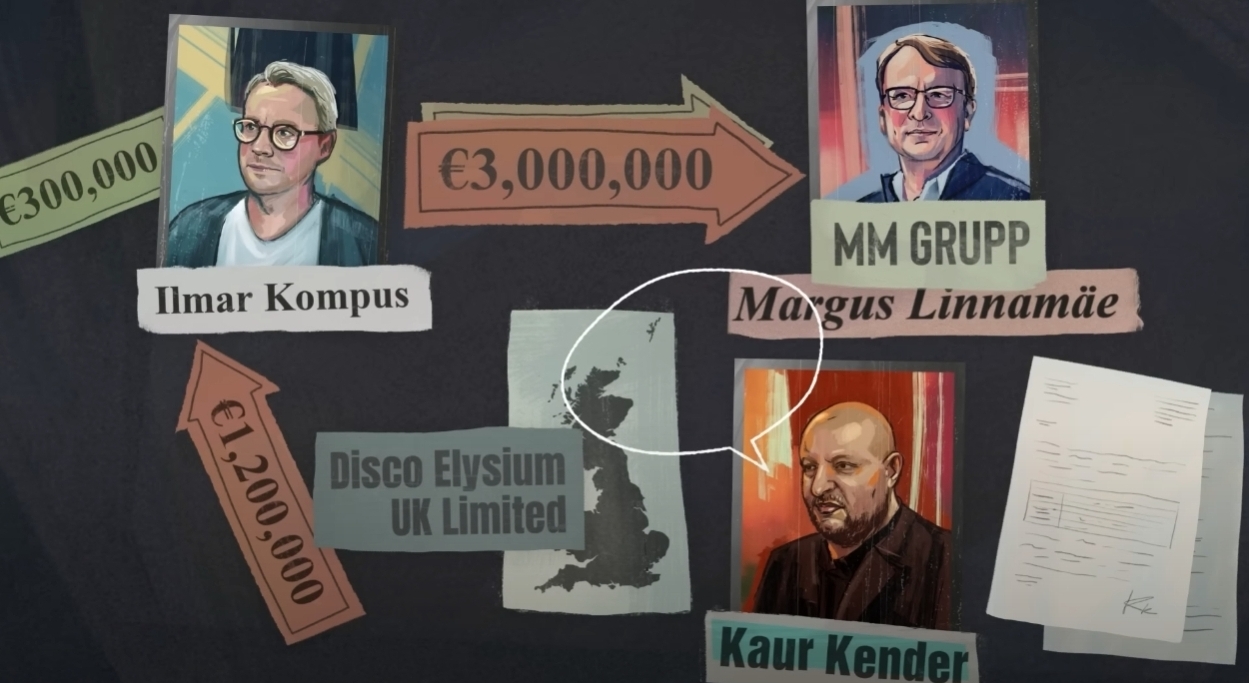
Alleged scheme of how Ilmar Kompus acquired a controlling stake in ZA/UM (illustrated by People Make Games)
- Kompus told People Make Games that Kurvitz and Rostov were aware of the acquisition of MM Grupp’s stake, but his discussions with ZA/UM shareholders were mostly oral because “we still are quite an informal organization, and back then, even more so” — plus there is no written track on this process;
- So there is no way to currently prove whether Kurvitz and Rostov really knew about the share buyout upfront or how legal the whole thing was (perhaps, this is something that can only be decided in court at this point);
- Speaking of the Pioneer One controversy, Kompus noted that it was IP that he backed with his own finances, adding that he isn’t allowed to publicly go into full details about this transaction because it involves shareholder information;
- Kender later dropped his lawsuit against Kompus and ZA/UM, but the IP buyout and the emergence of the funds needed to complete the deal with Linnamäe is still shrouded in mystery (even though the €4.8 million were later repaid to ZA/UM in three parts);
- On top of that, Kender went on to defend ZA/UM from Kurvitz’s and Rostov’s allegations in a separate court case and eventually sold his shares in the studio to Kompus, bringing the total stake of the latter to 79.3%.
Who owns the rights to the Disco Elysium sequel?
Another interesting point in the People Make Games investigation are Kender’s claims that Linnamäe originally expected ZA/UM to make three Elysium-based games over a 10-year period. And the businessman allegedly only agreed to leave the Estonian company if he kept his stake in the Disco Elysium sequel:
- The rights to ZA/UM’s next game were held at Newelysium Ltd, a new subsidiary established in 2020 specifically for this purpose. Linnamäe controled a 10% stake, with the rest being split between Kompus (5%) and ZAUM UK Ltd (85%);
- Given the structure of ZAUM UK Ltd, Kurvitz, Rostov, Kender, and Reiman each received 21.25% of the shares of Newelysium Ltd;
- It is still unclear how Kompus convinced other shareholders to approve his acquisition of Linnamäe’s stake, but perhaps the main point was that Kurvitz, Rostov, and others would get more dividends from Disco Elysium 2 in the future;
- However, things soon started falling apart, leading to multiple accusations, and many details seem to still have remained behind the scenes.
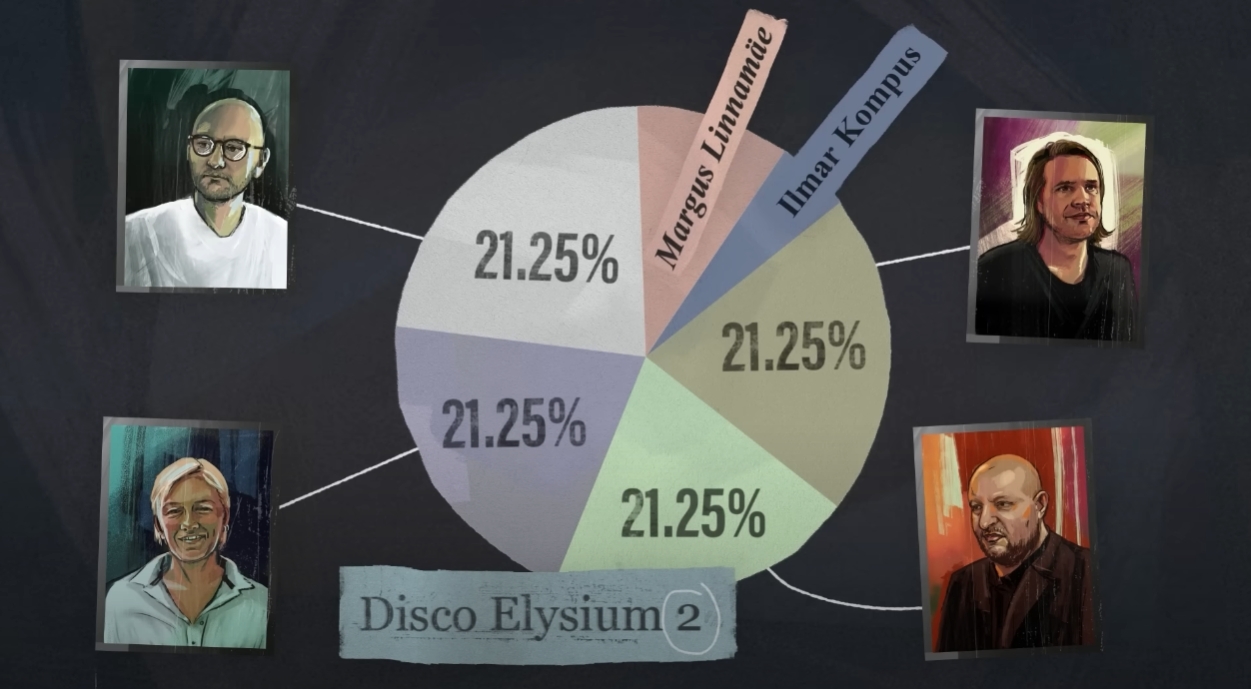
Newelysium’s business structure aka the rights to Disco Elysium 2 (illustrated by People Make Games)
What do ZA/UM employees have to say about Robert Kurvitz?
Argo Tuulik, a ZA/UM writer who has known Robert Kurvitz for more than 20 years now, told People Make Games that the way Kurvitz presented his version of events was “dishonest and manipulative.”
Tuulik created many characters for the game, such as Cuno, Evrart, and Hardie Boys, as well as some important story scenes. Although he admired Kurvitz as a writer and creative genius at the beginning, they had “this leader-follower relationship” that needed to be broken and made more equal.
After the scandal went public, ZA/UM accused Kurvitz and Aleksander Rostov of misconduct and creating a toxic environment. Here is what Tuulik and some other ZA/UM developers said about working under their leadership:
- Tuulik describes the Elysium creator as an “incredibly magnetic person” who didn’t have enough leadership skills: “I don’t think he understood that to lead is a burden, not a privellege”;
- Kurvitz didn’t know how to properly communicate with employees and, for example, could easily scrap four days of work that other writers showed him;
- Speaking about the toxicity allegations, Tuulik noted that Robert’s approach taught him to handle criticism and be a better professional, but others may have taken his comments more personally;
- Nine months leading up to the launch of Disco Elysium, the whole team was in “mega crunch”, so devs took several months to recover. However, Kurvitz’s time-off dragged on, as he was supposed to start conceptualizing the sequel, but allegedly didn’t do much work while the rest of the team was making The Final Cut;
- According to lead artist Kaspar Tamsalu, both Kurvitz and Rostov checked out from most of the management work that had to be done after the release of Disco Elysium to improve the studio’s workplace culture and resolve some internal issues;
- According to Tuulik, Kurvitz didn’t write a single word on The Final Cut, and Helen Hindpere “wasn’t really much involved” either despite being the lead writer (this was confirmed by other writers);
- It turns out that most of Helen’s duties were handled by Justin Keenan, who also said that Kurvitz had an inner circle of close, privileged people he put above the rest of the team;
- At one point in time, Kurvitz allegedly told Tamsalu that he plans to work on a new game for the next seven years, for which he only needs two writers and Rostov as an artist. Although Robert later retracted these claims, this was another example of his approach to forming smaller groups of people with “preferential treatment”;
- Keenan also recalled how Kurvitz, while on vacation, asked him to give two junior writers feedback that they won’t be on the core team for the next project despite being great professionals — it later turned out that Robert hadn’t even reviewed their work;
- “I was humilated and angry about that because he had made me do his dirty work for him in a way. It was completely unnecessary, and he lied,” Keenan said;
- At the time when Kurvitz confronted the management and owners, some other employees already didn’t want to see him as a lead on the next game. But his plan was to shelve a sequel, make a smaller title under the leadership of Keenan and another writer, and thus prove to executive producers that he had changed his approach and was ready to become the creative director of Disco Elysium 2;
- “I was there in the trenches doing the work, dealing with their bullshit, and they didn’t just care about anyone else at all,” Tamsalu said about Rostov and Kurvitz;
- Some developers and regular employees even received death threats on social media and personal emails after the beginning of this scandal. And, according to Tamsalu, Kurvitz and Rostov did nothing to stop this hate campaign despite the fact that they were aware of those comments;
- Despite all the issues and the conflict with shareholders, Tuulik still thinks that Kurvitz should be able to operate in the world of Elysium and create new projects, just like any other person involved in the development of the first game.
What is Kuvitz and Rostov’s version of the story?
In an interview with People Make Games, bith Kurvitz and Rostov noted that they were exhausted by the long development of Disco Elysium. Robert specifically said he had worked non-stop for around 60 months, so they decided to take a little break after the launch.
He noted that while he didn’t work “12 hours a day” anymore during The Final Cut production, he always tried to keep an eye on the quality of the game. He thinks he that some things could have been done and managed better on his side, but he won’t apologize for needing a rest and psychotherapy after the work on the original game.
By the summer of 2022, Rostov and Kurvitz were demoted from their leadership positions in any future titles. Robert also added that he didn’t even know at the time that Ilmar Kompus had already bought out ZA/UM.
After that, Kurvitz requested access to company documents from Kompus, including corporate structures, sales figures, dividend plans, shareholder agreements, and employment contracts. The two had a meeting in November, which led to Kurvitz being fired from ZA/UM (the dismissals of Hindpere and Rostov followed shortly after).
Here’s what Kurvitz has to say about Kompus reselling the IP rights to ZA/UM for €4.8 million to finalize the deal with Linnamäe: “I don’t want to be critical of anyone’s work, but it wasn’t the best IP I’ve ever seen, and it hadn’t appreciated in his hands from £1 to 4.5 million dramatically. And this is my opinion as a video game developer”
In December 2022, Kompus also approached Kurvitz and Rostov to buy their stakes in ZA/UM for around “$2.5 million or something.” But both creators rejected this offer.
And here is what Robert Kurvitz said about the toxicity allegations:
“I ask if I’m a good leader or if I worked well, I ask myself everyday if I did that. But my original contact with these claims came from a person who took money from the company’s account, who’s been threating me […] I’m really sorry that not all relationships between people have survived this ordeal. It’s been very painful for many of the ex-employees of the company. The production of the game didn’t go in a good way.”
In another comment to People Make Games, Kurvitz said he won’t participate in a “public war of words” organized by Kompus and Haavel to “direct attention from their suspected criminal activity.” However, he didn’t directly mention any of the issues brought up by Argo Tuulik or his other colleagues.
Here is the final quote from Kurvitz’s statement to People Make Games:
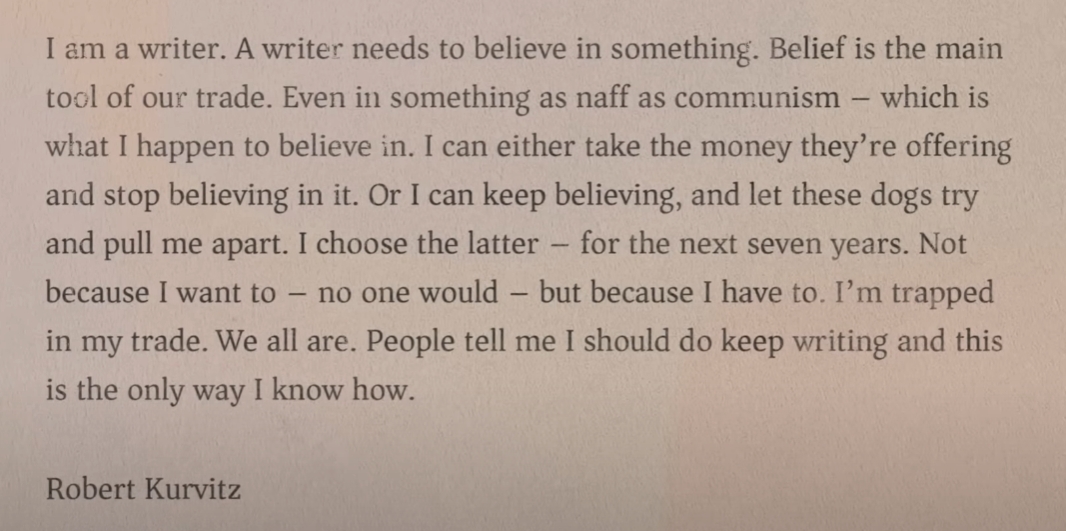
Kurvitz’s alleged attempt to steal the source code of Disco Elysium
A few days before Kurvitz was fired, he approached ZA/UM lead technologist Petteri Sulonen with some request. Sulonen couldn’t provide much details about it to People Make Games, but noted that it was “very much in line with what the management alleges that he did.” He added that if he agreed to what Robert asked him for, he would be dismissed instead or face even harsher punishment.
Ilmar Kompus claims that Kurvitz tried to get the source code for Disco Elysium and start a new studio. According to Robert, the official reason for firing him and Rostov was that they allegedly tried to steal the IP from ZA/UM and sell it other game companies (like Ubisoft, Microsoft, and even Larian).
Both developers, however, deny these accusations and say they had no negotiations with other publishers regarding Disco Elysium or any other intellectual property owned by ZA/UM.
New studio, investment from NetEase, and new IP
During a court hearing attended by People Make Games, a ZA/UM lawyer revealed that Kurvitz and Rostov had set up a new company called Red Info Box in the UK. According to the Endole database, a private company with this name (currently legally referred to as Red Info Ltd) was incorporated on June 22, 2022 in Hove, East Sussex.
It originally had two directors, Robert Kurvitz and Aleksander Rostov — a writer and an artist respectively. In December 2022, they were joined by Qihao Liu and Ronald Tanner. The latter runs R S Tanner Ltd, a consulting company that helps CEOs grow their businesses.
Kurvitz and Rostov also trademarked the name “Corinthians”, a possible codename for their new IP. They both recently attended the 2023 Game Developers Conference, but details about the game or Red Info itself haven’t yet been disclosed publicly.
The next hearing in the case between Kurvitz/Rostov and Kompus/ZAUM is scheduled for September. But for now, the fate of Disco Elysium 2 and the future of developers and writers still working at the studio remains unclear.
More details about the whole story, including interviews with Kompus, Tuulik, Kurvitz, Rostov, and Hindpere, can be found in the full video below.